SAVE 60% OF YOUR MOBILE APP DEVELOPMENT COST AND TIME BY DEVELOPING AN MVP
This article is going to be all about a comparatively common term which many entrepreneurs neglect when it comes to mobile app development – MVP App Design and MVP App Development for their mobile app based business.
The competition is fierce when it comes to mobile app development. You think of an idea and boom! Someone already has built a similar product somewhere or the other.
It’s quite a lot challenging to come up with a mobile app idea which is 100% unique. But it’s even more challenging to figure out –
How to beat the existing competition in the mobile app industry?
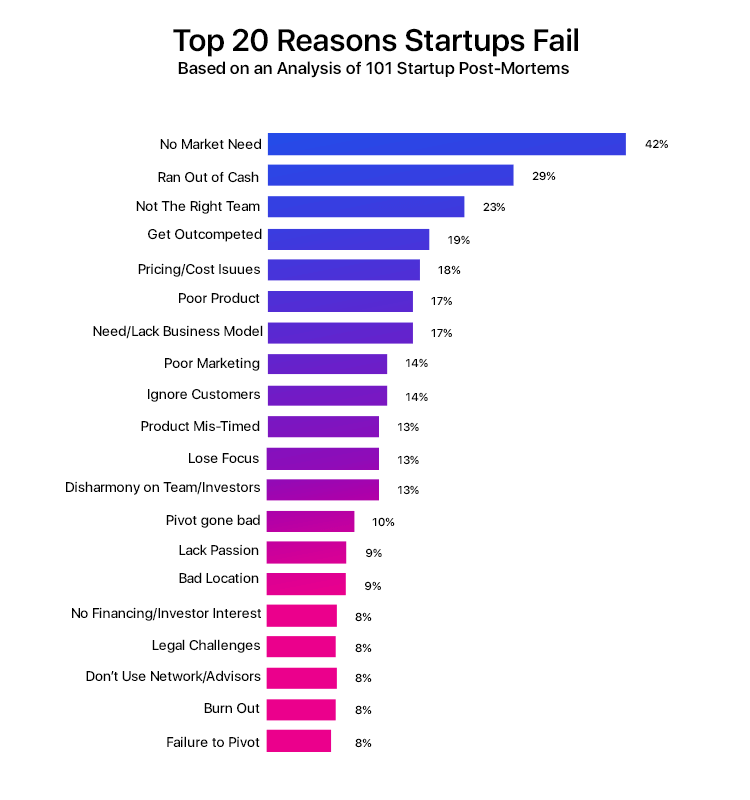
Everyone is competing with the other to launch their product in the market first.
Gaining the competitive edge in the market has become a
- NORM
more than an
- EXCEPTION.
If your mobile app doesn’t have the competitive edge, surviving in the market is going to be difficult.
A mobile app user always has three expectations from any mobile app he/she uses –
- Smooth app navigational experience.
- To-the point solution for the requisite problem in hand.
and
- A well-maintained feedback and customer support channel.
If your app has all the above, there is nothing that can stop it from becoming a hit. If not, It’s time to re-work.
The reason I am discussing this is because –
At ChromeInfotech, we have developed a plethora of apps for various industry segments.
Majority of the apps went on to become a market hit. Each of them were well funded (above a million-dollar mark) and were a customer-viable product.
Some of them did not perform up to the mark despite having backing of –
- Adequate amount of funds
and
- Concrete Market Research behind them.
So let me bring forward the main point of discussion –
MVP (Minimum Viable Product) App Design ,
before your start with the product development.
Instead of getting into the fundamentals of MVP at this stage, let me shed some light on the core aspects that makes it critical to –
- Have an MVP first
and then the
- Final Product.
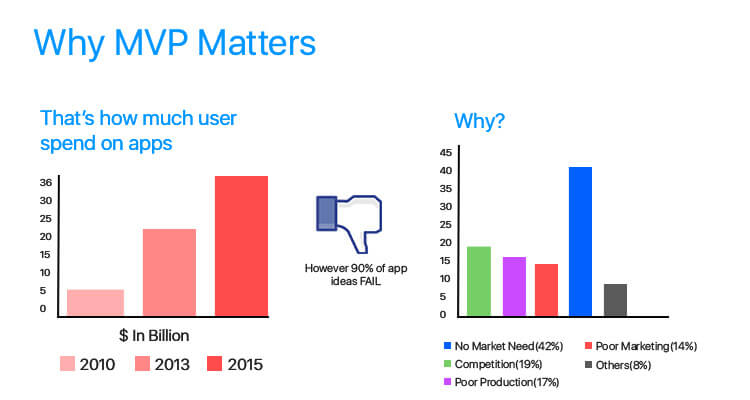
All the below 6 aspects when combined together, determines the success ratio of your app in the long run.
- Uniqueness of your app.
- User experience you aim to provide.
- Needs and expectations of your users from your app.
- User perception about your product and the industry.
- Relevance of the solution for the problem at hand.
- Monetary aspects
Now, let’s transition through each one of them.
- Before you get into the development of your app –
It’s necessary to validate the uniqueness of your app idea from the market audience,
who can be the potential users of your app in the future.
- You need to give a glimpse of the user experience to your potential audience that you are striving to provide them. This will help you to understand the way your audience will perceive and accept your product.
- Every mobile app user has certain needs because of which he/she installs a particular app. You need to know the exact needs and requirements of your users. Then it is your responsibility to give them a glimpse of the solution you will be providing.
- User perception about an app is the ultimate feedback you will ever get for your upcoming product.
Presenting a set of basic features to your audience that you plan to incorporate in your app, will help you understand –
- What the user thinks about your product
and
- How he/she will adapt to it in the long run.
- Then comes the aspect of the relevance your app shares with the problem you want to solve. Presenting a glimpse of your solution to the user will help you and your users both to understand the product’s relevance to the problem in hand.
- Lastly, there are the financial aspects. When you involve your potentials users in your project in the early stages, your ratio of success manifolds. Also it helps you to plan your project finances much more efficiently. This is due to effective and constructive user feedback and your increased clarity about the mobile app project.
We at ChromeInfotech, have developed a huge number of apps for top international clients.
Out of the total apps that succeeded in the market and became a hit-
- 27% of the clients validated their app idea from the audience.
- 19% of them presented an initial glimpse of their product and user experience to the users and gained their feedback.
- 16% of them validated their idea’s relevance as per industry requirements.
- 23% clients ended up developing better financial strategies due to early involvement of users in their project. They indulged in user feedback mechanism right from the beginning.
and
- The remaining 15% clients did all the above.
Out of the total apps that failed –
- 46% clients did not involve potentials users in the early stages of app development.
- 37% were unable to derive optimized financial strategy to conquer the market.
- The remaining 17% were too arrogant and continued with their own mind-set.
So now let’s answer the question –
WHAT IS A MOBILE MVP APP DEVELOPMENT AND WHY WE NEED TO GO FOR MVP APP DESIGN?
Before we start dealing with MVP mobile app OR the aspect of mobile app development MVP OR what is meant by MVP design and development, you need to understand certain aspects. These aspects which are related to minimum viable product mobile app development OR in general MVP development are highly critical to the overall success of your mobile app based business.
But don’t worry. ChromeInfotech as an MVP development company, plays one of the major role in shaping the future of many emerging mobile apps based businesses. Also we help you to save 60% of your money and time through an exclusive MVP development cost planner that can help you set up your business in the most cost effective way.
MVP stands for Minimum Viable Product. It is not the complete mobile app but a part of the app having the essential features that your users will need at the very initial stage.
MVP App Development is the solution to MVP App Design questions like how –
- Can I ensure the success of my app?
- To make a more customer viable product?
- Can I reduce the failure rate of my app?
When you build your first app, to be on the safer side, you develop an MVP. Through the MVP, you give your audience a bare-bone version of your mobile app with the main purpose of allowing –
- You
and
- Your Team,
with meaningful data related to your potential customers –
- With less effort
and
- Within a short span of time.
Mobile MVP App Development is a tedious process. MVP App Design needs to be done with patience or many things could go wrong.
At many time instants you will come across a situation where you will feel you are doing a lot, but in actual reality you won’t be getting productive.
As per Nat Eliason, you should avoid these 8 pitfalls that trick you into feeling productive while you indulge in MVP App Development or MVP App Design. It’s important to be productive rather than feeling productive because in the end you will realise that you did a lot but nothing was productive.
Please note one thing that in this article MVP App Development and MVP App Design are used to refer to MVP. So don’t get confused between these two terms.
Coming back to MVP App Development / MVP App Design, you should note one thing. Mobile app MVP is nothing but a combination of three essentials components. Your –
- Pitch
- Product
- Metrics
Let’s get into each one of them.
Pitch
It comprises of your brand story. A brand story is nothing but the unique story you put behind your brand that compels users to engage with your brand. Your brand story is creating your USP which in return drive excellent sales and generates revenue at later stages.
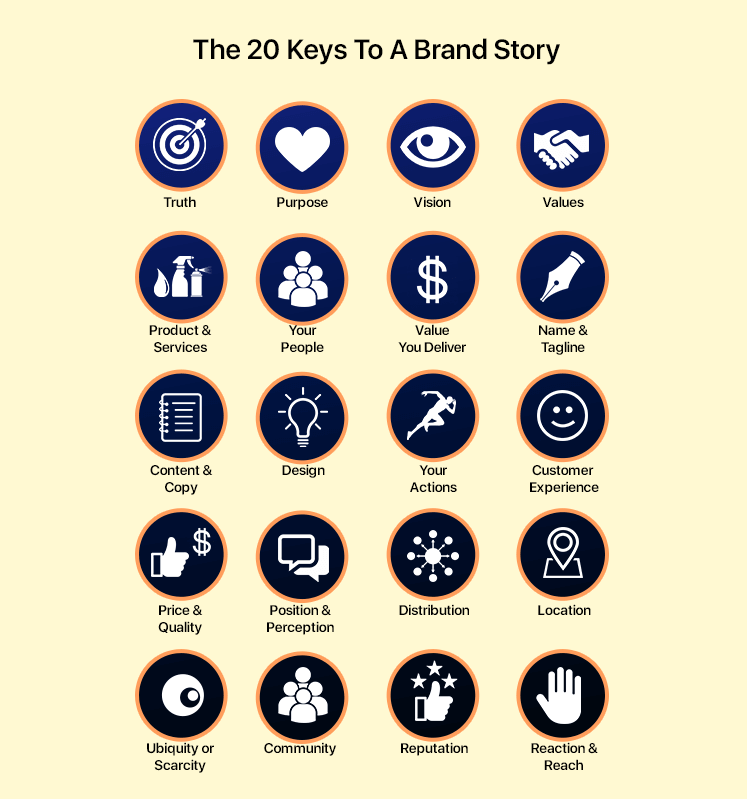
When you go for pitch, you present your idea to the relevant stakeholders to make them engage with your product. This can be only done if your users are convinced enough that you are offering them something promising to solve their problems.
There can be uncountable approaches to pitch your idea to the stakeholders. It depends from person to person and team to team. But, out of all those, the most promising one is the Data Driven Story Telling Approach to pitch your idea to your stakeholders if you have decided to go with MVP App Development
Let me tell you why? Most of the mobile apps created today work on data, be it from any category.
More than 90% mobile apps require some kind of data to function and carry out their requisite task.
So the only story-telling approach that can guarantee you success in the long run is the one which is powered by loads of relevant data.
Moreover, data drives every strategy that you create for generating revenue and sales. So it’s better to adapt to data driven methodologies for your MVP App Development if you want to save your time.
Some of the advantages of data-driven methodologies for MVP App Development are:
- Quick development of your mobile app MVP.
- It makes the MVP App Design process a lot easier.
- One of the best approach for small to medium scale MVP App Development projects.
Let’s have a quick look at some of the examples of MVPs that are data driven.
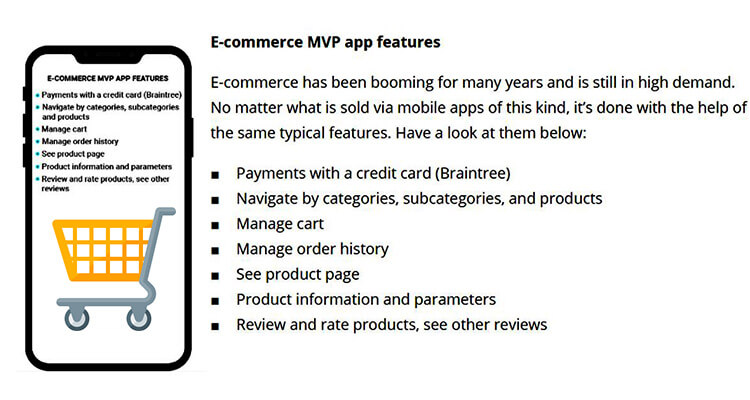
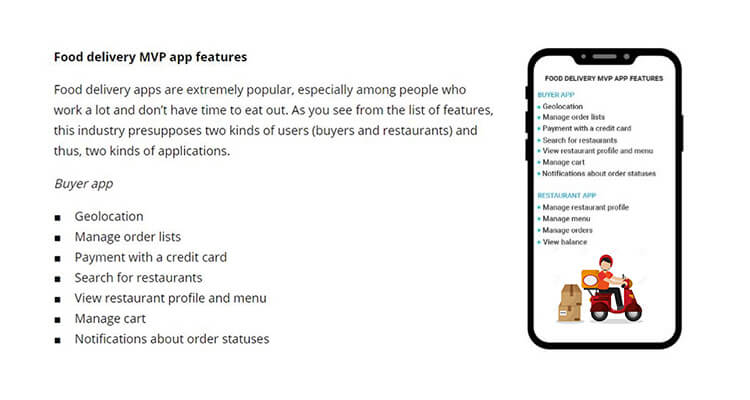
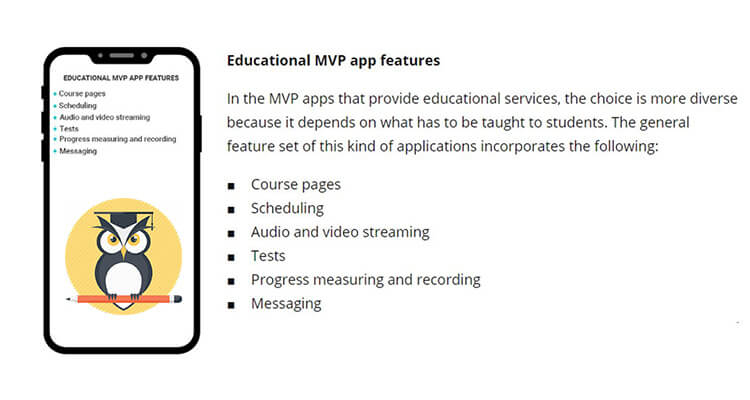
Before you read any further, understand one thing:
MVP design and development is crucial in the present time because most of the mobile app based start-ups fail to perform to their mark. A minimum viable product mobile app development phase is highly critical in deciding the overall direction of the future of your mobile app.
MVP development cost is quite low as compared to the development of the final app version. Because only the most important features are included in the making of a MVP mobile app. ChromeInfotech as an MVP development company helps to effectively plan your app development future so that you can have peaceful nights.
Product
This is your actual digital product that resonates with your brand story. Here you create something of value so that people will be willing to engage with you.
You provide a set of all the basic features to the users that are highly critical to their needs and can kick-start your app based business.
Let me give you an example of a popular brand that began as an MVP and is now a huge establishment today –
Uber:
Uber is one of the famous on-demand taxi app that began its journey in 2010. It was launched as a MVP that had basic features like –
- Connecting cab drivers and iPhone owners through an iPhone app.
- Credit card payments.
It didn’t incorporate complex functionalities like –
- High end graphics elements,
- Fare splitting privileges, and
- Other complex functions
Travis Kalanick and Garret Camp –
- Marketed uber
- Gathered feedback
and
- Raised significant amount of funding to become a billion-dollar company today just by the development of their app’s MVP.
Metrics
Here you define the benchmarks to follow to keep your success ratio growing. At ChromeInfotech, we have catered to a plethora of international clients for mobile MVP App Development projects.
Most of them had certain benchmarks or metrics which they wanted to maintain for their app such as –
- Attaining a certain number of app installs within 1 month of launch on the app store.
- How many times the app has been downloaded and uninstalled in the past one week.
- Is the app getting quality and genuine reviews from those who are using it on a regular basis? Or is it getting fake reviews from the audience?
- Percentage of users retaining their trust to the app and not uninstalling the app ever since they installed it.
Many other clients had some other set of metrics for their app such as –
- Determining the user engagement pattern in 2 months, 3 months, 6 months and 12 months
- Figuring out break-even metrics. It refers to achieving a minimum level of revenue generation from the app to break even the investments done. Revenue generation is directly to the value you provide to the user. SO indirectly, through a transitive property relation, you can determine the User Lifetime Value of your app once you determine your break-even metrics.
- Determining the correct channels that work best for their app and sticking to it for a certain period of time to drive results. Example of such channels can be Facebook, YouTube, Instagram, etc.
- Analysing the effect of various types of digital ads on the overall success ratio of their app.
- Monitoring the analytics related aspects of your app with a certain app analytics tool.
As per our recommendation, these are the top tools you can use for creating an MVP of your mobile app project.
Let’s have a quick look at the above three tools to understand which tool work best for you.
PROTO.IO
- This is by far the most preferred tool for designing an MVP for a mobile app project.
- It supports all the important and major mobile application related gestures as well as touch events.
- You even get the feature of animated screen transitions to clearly depicts the vision and purpose behind your mobile app MVP.
- Quite a lot easy to get started and get used to with UI controls.
- It works for a variety of mobile devices.
- Dropbox integration provided
MARVEL
- One of the fine tools for creating the MVP of your mobile app project that can convert any image including PSD into highly interactive prototypes.
- Easy to use.
- Works for iPhone.
- You will get Dropbox integration here too
INVISION
- Using this tool, you can create realistic and interactive wireframes for your MVP and trust me – you won’t have to compromise on your core vision. Simply replicate your vision on to the tool.
- It is simplistic to use and can be learned quickly.
- Works for a lot of devices.
- Yes. Dropbox integration is provided
So to sum up,
Mobile MVP App Development = YOUR PITCH / COMPELLING BRAND STORY + YOUR INITIAL KICK-START PRODUCT + YOUR METRICS / BENCHMARKS
As per cbinsights, nearly 42% of mobile app start-ups fail because they cannot find their target audience. But, as per our analysis and previous experiences with top international clients, It’s our recommendation for you to focus on building your target audience first to –
Better understand them and know about the needs of your target audience.
For example: If you want to create a fitness app where you aspire to bring together fitness trainers and aspiring fitness enthusiasts, then building target audience in the first place will serve these purposes:
- You will get to understand how many aspiring fitness enthusiasts are present that you can possible target at the initial level.
- How many certified fitness trainers are there in the market who want to connect to fitness enthusiasts?
- You will surely get an answer to this also.
and
- Lastly you will be able to connect to both the communities of fitness trainers and fitness enthusiasts and build a strong relation for long term user retention.
Get an inside grip of your user’s expectations from your product.
Your potential users need to solve their problems one way or the other. So, if you can give them the best solution for their problems, you will win. In-short fulfilling the user expectation is the core objective of any mobile app.
For example: Let’s consider the same fitness app mentioned above. Building a target audience will help you to connect to both the communities of fitness trainers and fitness enthusiasts.
Now you can either indulge in one to one communication with them or communicate via other means to address many at one single time. It’s up to you. The point is –
- You will learn what the community of fitness trainers expect from the mobile app market to better connect with fitness enthusiasts.
- Also, you will understand the expectations of the fitness enthusiasts from the mobile app industry to better connect with highly skilled and qualified fitness trainers.
- Not only this, but you will also understand the expectations of the entire fitness industry when it comes to bridging the gap between certified trainers and those who want to get fit.
Generate an effective feedback mechanism and interaction.
Feedback is a two-way process and building your target audience maintains the existence of this process.
For example: Building a target audience will help you to get constructive feedback from both the communities of certified fitness trainers and fitness enthusiasts. This will help you to incorporate exactly those things which they need from your mobile app.
It will also help your fitness app to evolve as with upcoming trends and happenings in the fitness industry, you will be better aware of what changes to incorporate in your product. This is where the relation between you and the communities of fitness trainers and enthusiasts will pay off finally.
So in a nutshell, these are the takeaways from the above discussion if you figure out your target audience in time –
- You get the chance to create a group of engaged customers ahead of time.
- Product development and user feedback incorporation goes hand in hand.
- You can actually build the most relevant product for your users.
- Pitching to an investor becomes a lot easier because having an initial user base depicts demand for your app.
and
- Product iteration becomes a lot easier and effective as the MVP App Development process continues. Reason being – the presence of a captive audience that adds value to your project and vice versa.
Now, let me cater to an important aspect here. Many of you might get confused with these two terms –
MINIMUM VIABLE PRODUCT
and
MINIMUM PRODUCT.
For your information, both are different.
- A minimum viable product is a glimpse of your mobile app product with all the basic features you aim to provide to your users.
- But, a minimum product is the basic version of your product/mobile app. In short it is the version 1.0 of your mobile app.
You can save a lot of time when you go for mobile MVP App Development. It is faster than traditional MVP App Development process which take loads of times to finalise the product before market launch.
MVP facilitates the learning process as quickly as possible to generate user interest in your product. It is a simple tool that will help you to build your first MVP app successfully and a sustainable mobile app business with less effort and the development will be worth it. To know more about popular brands that began as a MVP and are huge companies today, Click here
MVP App Design is the essence of Mobile MVP App Development
The biggest advantage of creating an MVP for your mobile app project is that – MVP focusses on a single idea and eliminates all other secondary functions.
Following the MVP approach for the development of your minimal possible solution to the problem at hand helps you to create a LEAN Start-Up company. It’s a company which you build on a lower budget in a reasonable timeframe. The primary objectives are to save time and money. Have a look at the below image to get the initial idea about what a LEAN start-Up deals with.
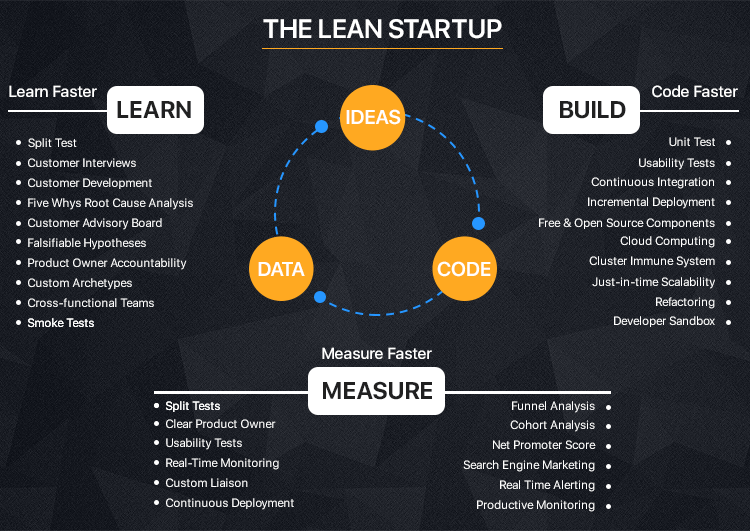
You strive to gain customers as quickly as possible because the rate of risk is very minimal. There are no huge investments involved because of which the cost of making an app is significantly low. So while creating your MVP, always determine the crucial functionalities and build a simplified digital product. This will ease your mobile app development MVP phase.
To better understand the process of building a minimum viable product for your mobile app from first step to the end step, consider the first image and ignore the approach described in the second image below.


So basically, MVP is a cycle of three important processes that keeps on repeating itself cycle by cycle.
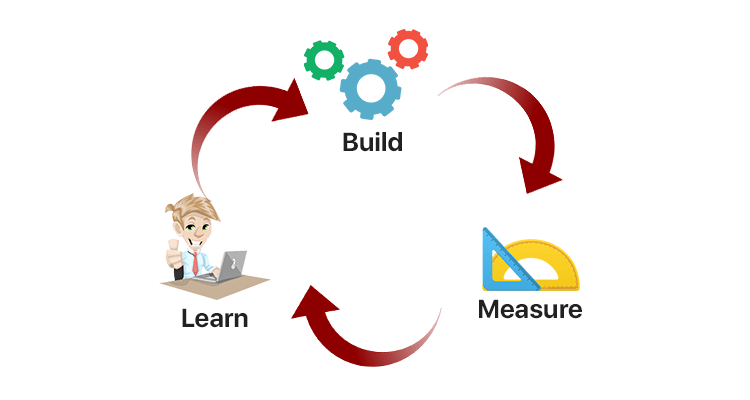
Let’s dive deeper into the fundamentals of MVP App Development / MVP App Design
Deciding to build an MVP for your mobile app project requires a lot of filtering. You have a long list of features that you want to put in place in your final app. But creating an MVP boils down to filtering those features to a set of highly essential features that deserves top priority.
The main goal of creating an MVP is to get something into the hands of your users using as little money and time possible. So the most important question that needs an answer is –
How to achieve the set of app features that you should include in your MVP, by filtering the complete list of your app’s features?
Have a look at the below image.
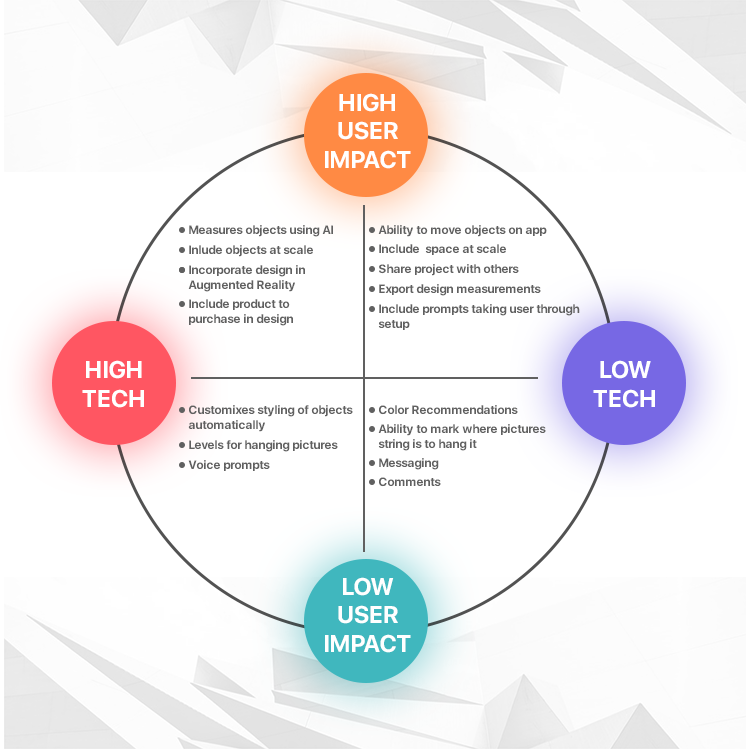
All your MVP App Design features will fall into one of the categories below:
- MVP App Design features requiring high technology and will have high user impact.
- Features requiring low technology and will have high user impact.
- MVP App Design features requiring high technology and will have low user impact.
- MVP App Design features requiring low technology and will have low user impact.
Let me explain you.
- High technology features means a particular feature of your app requires high level of technical inputs to come to reality.
- In the same way it goes for a low technology feature of your app.
- High user impact feature means that a particular feature of your app has the tendency to leave a high impact on the user.
- In the same way it goes for a low user impact feature of your app.
Now to figure out the set of features that you should include in your MVP –
Select all the features from the main list which are:
- Low technology features with high user impact,
And to some extent select –
- High technology features with high user impact, until and unless you are in sync with your MVP timeline and budget constraints.
Quick Tip 1:
Always stay away from implementing those features which appear to be cool and shiny. By cool and shiny I mean refrain yourself from implementing those features which are difficult to implement or will have low user impact.
Now since it’s quite clear to you at this stage how to select the features for your MVP, it’s time to get into –
MOBILE MVP APP DEVELOPMENT: HOW TO BUILD AN MVP OR A MINIMUM VIABLE PRODUCT IN ORDER TO END UP CREATING A HIT MOBILE APP FOR YOUR BUSINESS?
There are 3 main step that will make you clear how to build an MVP or a minimum viable product.
STEP 1: DEFINING YOUR MVP WITH CLARITY
Before your start with the development of your MVP, you need to have crystal clear clarity about what you are going to achieve. Let me clear it out.

STEP 2: CREATING WIREFRAME
After you are done with the above phase, it’s time to get to the real stuff. This is the phase where you design the wireframes of your MVP mobile application. Let me explain you what exactly a MOBILE WIREFRAME is.
A mobile app wire-frame is basically a low-fidelity representation of the MVP App Design. Your mobile app MVP is a very basic version of your actual mobile app. So just like your actual app, your mobile MVP is going to have certain designs for each and every screen.
When you create wire-frames for your mobile app MVP, you clearly focus on three important components:
- What are the main components of your MVP?
- How is the information structured through those various components? Here you define the co-relation between your app’s data and MVP.
- How is the interface interaction taking place? Here you describe the basic visualizations of your designs to the user.
The wire-frames of your mobile app is the backbone of your entire app’s design as well as its workflow and MVP App Design. Not only it shares relevance to you but also to your stakeholders. It is a representation of each and every important part of your ultimate product (in this case your mobile app MVP)
There are primarily two different ways to create wireframes for your mobile app MVP:
- Static Wire-framing also known as low-fidelity wire framing
- Dynamic Wire-Framing also known as high-fidelity wire framing
Don’t be confused by the term Fidelity. It is simply the degree or the extent up to which a wireframe conveys the look and feel of your final product (here final product is the MVP).
Fidelity projects the degree of detail and realism you integrate in your wireframes. Hence the term Low-fidelity and High-fidelity
Let’s have a quick look at the major differences between both of them for efficient MVP App Development / MVP App Design.
LOW FIDELITY WIREFRAMING
- One of the fastest method to convert high level concepts of MVP App Design into artefacts which is tangible and testable.
- When it comes to visual design, only some of the attributes of the final MVP is presented, such as element shapes, visual hierarchy, etc.
- In terms of content, only the key elements are depicted.
- Low fidelity wireframes are extremely low cost and significantly reduces the cost of making an app.
- You can create paper wireframes quite easily without too much effort.
- It is easy to understand for all the stakeholders involved in the MVP App Development project.
- Low fidelity wireframes are of two types – Paper wireframes and clickable wireframes. Paper wireframes are created on paper while clickable wireframes are created by linking one app screen to the other.
The disadvantage of this type of wire framing is that they cannot be used to portray highly graphical animations or transitions and hence have a limited interactivity.
HIGH FIDELITY WIREFRAMING
- It is one of those types of wireframes that resembles similarity to your actual product.
- It appears and functions both like an actual shipped product.
- This type of wireframe is created only when you have a deep understanding of what you are going to develop and need to test it with real users or to get final set of approvals from the stakeholders in terms of MVP App Design aspects.
The visual aspect is quite a lot detailed and made realistic.
- The various components such as interface elements, spacing between components, and the overall animation graphics look more or less like a real mobile app.
- Here in terms of content, almost everything goes there.
- High-fidelity wireframes are costly to develop and will surely increase the cost of creating an app.
- It requires quite a lot of effort and time investment to create high-fidelity wireframes.
- They are specifically created for clients and potential investors to make them understand clearly, how the product will work.
High-fidelity wireframes are of two types – Digital wireframe created using a specific tool, and coded wireframe which is created using coding techniques which resembles pretty close to the ready-to-use version of the final product.
- When it comes to the aspects of interactivity, they are highly realistic and graphical. Appears like the real MVP app
Now let’s have a look at the examples of both these type of wireframes. See the below image.
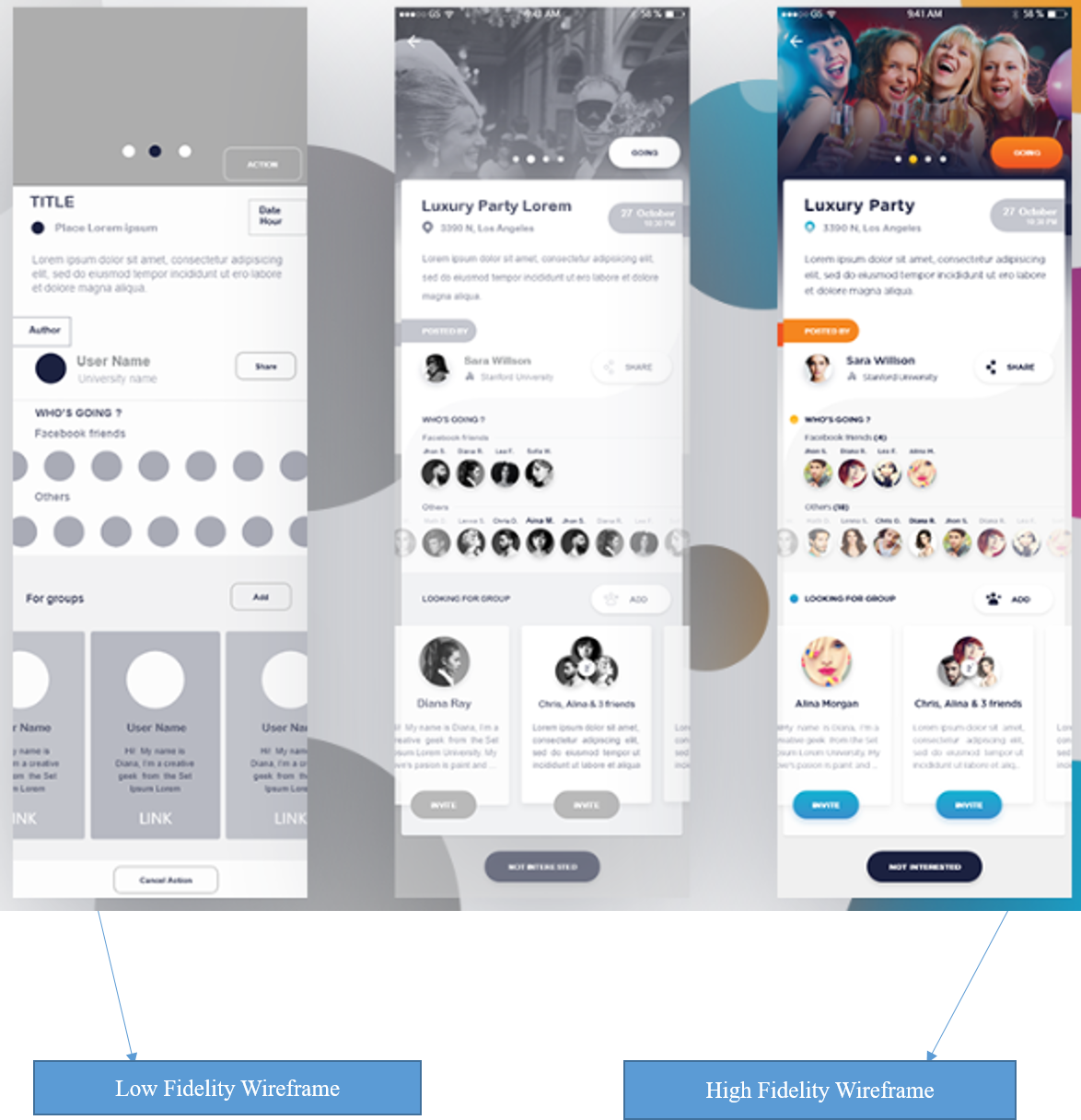
When it comes to developing wireframes for an MVP App Development, there are two critical factors to consider:
- Money spent
- Time invested
We at ChromeInfotech have catered to a wide variety of clients and from our personal experience there are few important categories in which the entire client base falls:
|
Client type |
Have surplus Time | Have surplus Money | Designs Present | Total % of such clients catered by Us. |
Our Recommendations |
| A | Yes | Yes | No | 18% | Create Low-fidelity wireframes and then High-Fidelity wireframes |
| B | Yes | No | No | 15% | Low-Fidelity Wireframes |
| C | No | Yes | No | 9% | High Fidelity Wireframes |
| D | No | No | No | 10% | Create Low-Fidelity Wireframes |
| E | Yes | Yes | Yes | 11% | High Fidelity Wireframes |
| F | Yes | No | Yes | 17% | Create much more detailed Low-Fidelity Wireframes |
| G | No | Yes | Yes | 13% | High Fidelity Wireframes |
| H | No | No | Yes | 7% | Create basic level low fidelity wireframes |
Now many of the clients remain curious about the time frame required to create a mobile app wireframe. Well it depends on a lot of factors such as:
- How many different number and types of screens are present in your MVP?
- No. of sub-applications present in your main application? (for example – a restaurant app can have separate app for the user and the restaurant)
- How better is the communication between you and your MVP App Development / MVP App Development company from which you are creating your wireframes?
So if you fall in any one of the above category, you know what to do. Also if you have an idea for a challenging mobile application and are looking forward to develop wireframes for your MVP first, click here.
STEP 3: DEVELOPING YOUR MOBILE APP MVP
Now since you are done with the wire-framing part of your mobile app MVP, it’s time to get into actual coding and develop that basic version of your about to become a hit app – Your mobile app MVP.
At this point of time you have the wireframes ready, the MVP App Design ready and the technology platform you want to develop your MVP for – Android, iOS or both.
Now the minimum time required to develop your MVP can be anything. That depends upon company to company. But as per our standard approach, we would let the client know that they have to wait for at least two months minimum before they get their functional MVP in hand.
Now the time duration required to develop an MVP depends on various factors –
- Team size
- Skillset of the team members
- Technology platform used
- Technology level catered to
- MVP App Design complexity/wire framing complexity.
- Infrastructural issues/software issues/bug testing.
All these factors combined define the time frame required to build your final MVP. If you want to know about the cost of developing an MVP, well it completely depends on your MVP App Design and how much features you want to integrate in your initial release.
You must note that out of all those, you team is your core asset that is going to be an integral part of your entire development phase.
A team usually comprises of the following members:
- Project Manager
- Product owner
- Business analyst
- Designer
- App developer
- QA engineer.
So a well maintained co-ordination is a must between every one of them to achieve the desired output in required time frame.
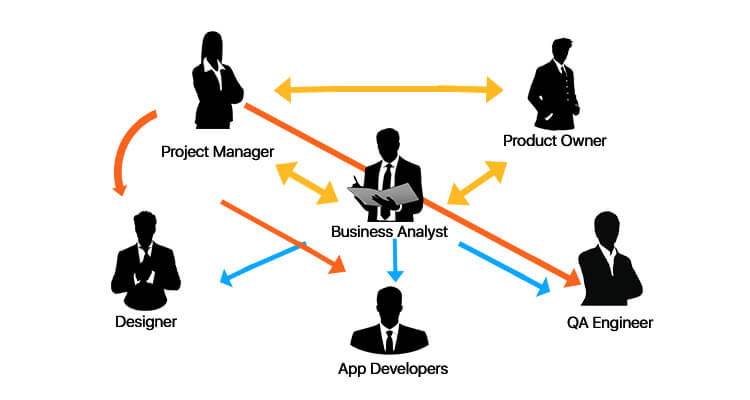
MVP App Design / MVP App Development takes the below mentioned steps:
- First of all, you code the frontend of your mobile app MVP using required technologies.
- After that, you move on to creating the backend of you MVP.
- Then you link your frontend and backend to the database via appropriate methodologies and software development techniques.
- After that you do the alpha testing of your MVP.
- Then you go for beta testing.
- Lastly you release your final product in the market and collect user response and feedback.
How to Increase Your Mobile App Installs With A/B Testing is one of the best guides to let you understand how to maximise your mobile app MVP installs after you have released it into the market.
MVP App Development / MVP App Design is a combination of four important components from the growth perspective:
- MVP App Design which has certain emotion attached to it.
- Usability aspects which will define the overall user experience.
- Degree of reliability on the product.
- And lastly the ease of using the functionalities to get your job done.
So the below image depicts exactly what an MVP looks like from the perspective of constant growth and evolution.
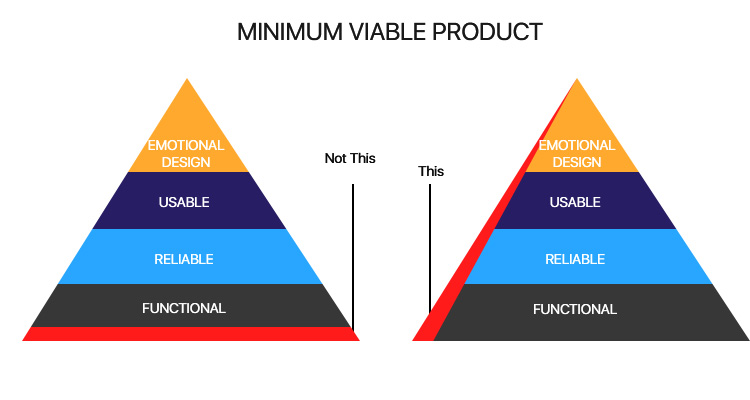
Another critical problem majority of the people faces is that which platform should I choose to develop my mobile app MVP? Well to answer that question you need to consider this –
- Figure out the demographic region you are targeting. If you are targeting a region that has more android users, go for creating a mobile app MVP based on android.
On the other hand, if the majority of users over your target demographic uses iPhone, then you know what to do – iPhone MVP App Development / iPhone MVP App Design
- Study your target audience. This is a must because you will get to know which is their preferred choice of OS. Your MVP is an experiment. So, it’s better to take calculated risks and avoid any significant problems later on.
- You need to figure out and understand the level of complexities involved in each of the platforms – android and iOS. If you think that android take more time for development, bugs caused are too many and solving issues is going to be critical for the developers, then don’t go for android MVP App Development. Similar is the case with iPhone MVP App Development.
Also remain focus to find an app developer that synergizes with you because MVP App Development is all about how quickly you find an app developer that is the right fit for you and bring your app idea to reality. Don’t rush into it but also don’t spend too much time on it.
- If you think that your target audience has equal composition of android and iPhone users, without giving a second thought go for cross platform MVP App Development / MVP App Design. Through this way you will be able to cater to your entire audience pool and this is an example of calculated risk.
Let me share with you one of the most successful instance of an MVP from ChromeInfotech that later went on to become one of the biggest hit app in the US real estate market. It is a true example of how crucial MVP App Development / MVP App Design is for your long term goal.
We had a US based client that came to us for the development of one of the finest app for home tour solutions. Their idea was named as CIWAO. It was mainly aimed at providing one of the most unique solution for real estate community as it allowed property owners to present their properties to potential customer in the most efficient and effective way.
CIWAO is a revolutionary technology, that allows buyers to enter homes for sale or for rent without a realtor/property manager and without an appointment.
It stands for “Come In We Are Open,” and it allows buyers to enter vacantly properties at any time, between 7 am and 7 pm, 7 days a week or occupied properties at times specified by the occupants of the home.
The CIWAO system includes 1 electronic door lock so the buyer doesn’t take possession of the home key; security cameras with cloud recording, and multiple CIWAO signs to drive people from nearby streets.
Before the actual product development went on, the client had a lot of technical barriers to overcome despite knowing which features they wanted to integrate in their final app. Let me give a you a brief idea.
Our clients at CIWAO wanted to create a home tour app by developing a co-ordination between the mobile device camera and required API’s.
For them,
- Selecting the right hardware vendor was a challenge for the right hardware integration.
- Attaining maximum security and authenticity was essential.
- Making the hardware compatible with software.
- Testing the software with GPS and hardware.
- Achieving client satisfaction was on top of their priority.
They were not sure whether their app idea was feasible or not. So we suggested them to go with creating an MVP first and that took us nearly 3 months to complete. During that period, we made the camera hardware compatible with the China APIs. We launched their MVP in the market and They showcased it to potential investors and other real estate entities. After that they developed a full-fledged app.
From the past 1.5 years CIWAO has been one of our most satisfied client that can be termed as a success story who went from MVP to a hit Mobile app.
To read the full success story, Click here.
Similarly, like CIWAO, we have many other success stories that started out as MVP and became a big hit later on.
Advantages of Mobile MVP App Development / MVP App Design
MVP App Development has a lot of advantages before moving to the final development of your mobile app. Let’s have a look at some of the major advantages of creating an MVP that will save you’re a lot of trouble in the long run.
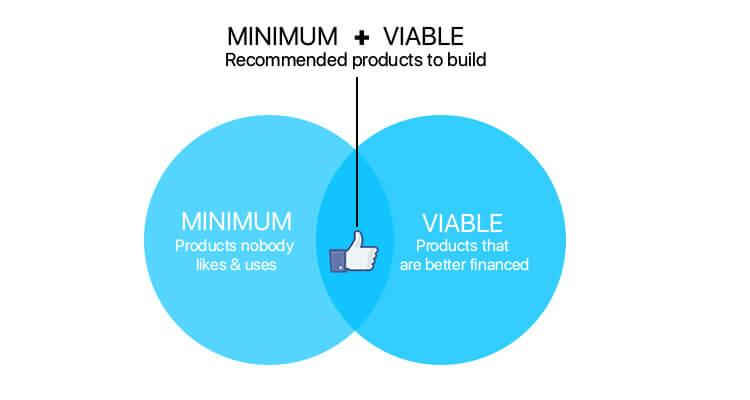
- If you want your LEAN start-up company to succeed, creating an MVP is a must. The essence is maximum output with limited money and time.
- You eliminate all the guess-work if you go for creating an MVP for your mobile app project. You become crystal clear what you have to integrate and why.
MVP is the second name of cost optimisation as it significantly reduces the cost of creating an app. Maximum output with minimum investment that the key to success in the long run.
MVP App Development / MVP App Design helps you to improve the technical performance of your app as well as helps you to better manage the resources at hand. This is because on the technical front, you try to incorporate as much low tech features possible and on the resources front, you try to incorporate the usage of as much limited resources you can.
- In terms of product security, you can be rest assured if you create an MVP. The presence of limited amount of feature allows you to incorporate the security aspects more easily and efficiently. Overall you will have to deal with less complexity.
- Creating a mobile app MVP means dealing with real-time use-cases. It saves a lot of time for those involved in the app testing.
- The biggest of all, MVP helps you to create a much better version of your final mobile app depending upon user feedback and engagement pattern.
- Developing an MVP speed up the process of your final mobile app’s iteration. You can easily come to the most optimised version 1.0 of your app if you create an MVP of your mobile app first.
CONCLUSION
Building an MVP for your next mobile app increases your chances of success by more than 50%. Mobile app MVP is like a secret sauce for your app based business. A lot of entrepreneurs who aspire to establish a successful mobile app business do not consider the importance of MVP App Development or MVP App Design
Not only building an MVP for your app helps you better understand how to create the most optimised final version of your mobile app, but also ensures the success of your business in the long run.
Skipping the development of MVP for your app first can cause significant damage to your business in the long run. Not only you will miss out the opportunity to build one of the best target audience for your product but also you will risk the process of revenue generation.
Sales is what drives business and if you are not able to make enough sales when you launch your product, you are a failure – that’s guaranteed for sure.
So it’s always safe to figure out whether your users need what you want to offer them. Developing an MVP for your app project is always the best option rather than opting for a full-fledged mobile app.
If you found this blog on MVP App Development / MVP App Design to be useful, do let us know your thoughts and comments in the comment section below.


 +1 (512) 3331-934
+1 (512) 3331-934 +44 (161) 8188-928
+44 (161) 8188-928
